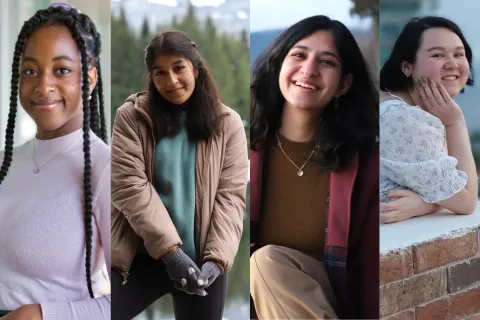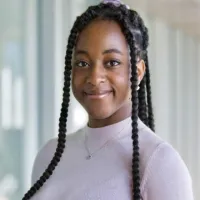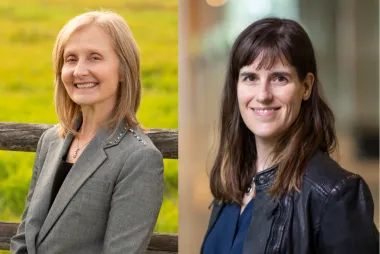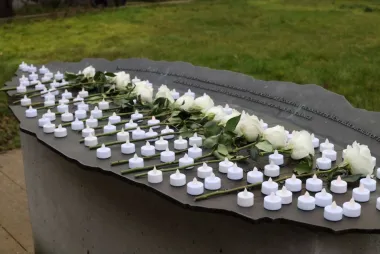UBC Engineering Class of 2022: Meet four women working to engineer a more inclusive world
On June 23, Women in Engineering Day, we look to the women of the past, present, and future who work to make contributions to the field of engineering.

Aliyah Ayorinde
Bachelor of Applied Science, Electrical Engineering

I’ll address the elephant in the room; in engineering, women are rare, Black women are even rarer, and neurodivergent Black women are practically unheard of. I spent the better part of my degree wrestling with an intense feeling of imposter syndrome and questioning any recognition I received, much to the detriment of my mental health. With the help of an amazing friend, I came to really understand that I earned my place and that I deserve to take up space as much as anyone else. This inspired me to not only speak up for myself but to be more fearless in advocating for others with marginalized identities as well.
In my opinion, the beauty of engineering is that it is inherently future focused. Engineering doesn’t just embrace ephemerality, it thrives off of it. I think that approaching anything from the lens of an engineer creates a resilience and adaptability that can be transferred to any career and can be useful in any scenario. In particular, learning how to approach a problem is one of the most important skills in engineering, and I employ the practice wherever I can.
In the future, I hope to continue advocating for integrating diversity into various spaces and learning more about how to serve the community through empathy.
Debalina Saha
Bachelor of Applied Science, Materials Engineering

As an undergraduate student I have had the pleasure of deconstructing colonial hierarchies and transforming engineering education with support from incredible faculty members. In the past couple of years I’ve watched our decolonization curriculum grow and spread across six engineering departments and 15 different courses. More faculty members and students are getting involved with reconciliation and design. I look forward to seeing new projects that focus on synthesizing sustainable design, reconciliation and intercultural learning.
I hope to learn more about engineering education and the intersection with equity, diversity and inclusion. I look forward to learning more about deconstructing colonial ideologies ingrained into our modern education systems. I hope to travel more, experience different parts of the world and make meaningful connections along the way, this is just the beginning.
I am inspired by young change-makers around the world. Initiating societal change without knowing the outcome is scary, I am inspired by their fearlessness.
Gauri Taneja
Bachelor of Applied Science, Materials Engineering

Resilience and problem-solving abilities – crucial elements of a survival toolkit that the UBC Engineering program added to my skillset. I learned how to design material for the satellite that one day will go within touching distance of the sun; at the same time, I got wings to fly with the EDII value system. I chose the latter. As contrary as these two avocations may seem, the value system in the Engineering program let me make a better choice.
I was blessed to be an Equity Ambassador in the Faculty of Applied Science, where I developed equity, diversity, inclusion, and indigeneity (EDII) framework, curriculum, and programs. Within a few months, I recognized that this was my calling and career path. From leading a design team and EDI initiatives to building surgical tools and a wonderful community, my university experiences have been deeply enriching.
I would like to develop strategic frameworks, competencies, and metrics for equity, diversity, inclusion, and indigeneity (EDII) in any organizational setting. To me, the capabilities of EDII are endless and the need of the hour. I would like to contribute to change that fosters stronger companies, equitable access to resources, better policies, and brave spaces.
Jessica Yamamoto
Bachelor of Applied Science, Chemical and Biological Engineering

As a mixed woman of colour, I’ve always been able to recognize when the people at the table don’t fully represent the people that can’t even get in the room. Fighting for diversity is one thing, but it needs to be combined with improving the community that we need to diversify so that it’s accessible to everyone. Now more than ever, I know the power of diversity and inclusion in university as this will hopefully lead to increased diversity and inclusion in the workplace which further supports creativity and innovation for these groups. I have the privilege of being able to go to university, which not many in my family have done, and this perspective has made me work hard to make this a safer and more equitable community for everyone so that we can all succeed.
Having diversity in any field is of the utmost importance and something that should always be strived for – having people who are BIPOC, 2SLGBTQIA+, disabled, and more – but for engineering, this means that those groups will be represented in the final design and ultimately have their needs met. Being at university with people from all over the world with different lived experiences has given me new perspectives that I will take with me throughout my life, and continually learn from.
Diversity in engineering leads to better innovation, something we need now more than ever.
Learn More
Read interviews from more UBC Faculty of Applied Science rising star students and alumni.


